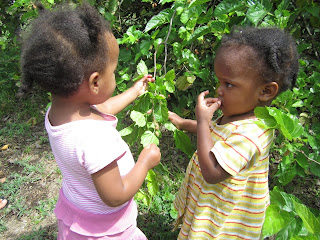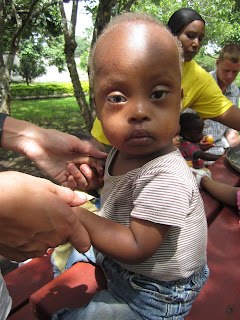On Monday,we visited all the families who live in a fairly poor area of town behind the supermarket. I had no idea there was such a huge population living behind Shoprite--it's almost like a city in itself. Hassan asked someone to show us the way to each house because finding them would have been impossible without a guide. The area we walked through was extremely windy; once we entered there was no way for us to tell which direction we were heading. The walkways were extremely narrow and on either side of us there were houses built out of mud and metal.
Navigating our way to the home stays
Visiting each of the families that day went really well. Scottie and I slowly figured out a sort of routine at each house, and we pretty much stuck to asking the same few questions. We usually asked who lived at the house, whether or not the child had brothers or sisters, how long they had been at the school, and what changes they had seen in their child since starting the school. All the parents had positive things to say about St. Dymphna, which was good to hear, and most of the families were happy to see us and very welcoming while we were there.
I think by far the hardest thing we encountered on Monday was seeing two of our favorite students, who are brother and sister, in their home. Most of the homes we saw were very similar and consisted of one or two small rooms with either a dirt or cement floor, a few pieces of furniture such as a bed, a china cabinet, and a couch, and walls that were made of either mud, metal, or cinder blocks. Most families decorate their houses with handkerchiefs on the sofa, chairs, and table, and with religious posters on the walls. Almost all the houses we visited were very small. What stood out so much when we visited Jackson and Lucia's house was that there was no furniture whatsoever, just piles of clothes on the floor and hanging on a line stretching across the one room. Both Jackson and Lucia were sweating from being inside the house all day, although they were both very excited to see us. Hassan noticed that outside they had two buckets fulls of guinea pigs, which Jackson told us they kept to eat. It was a humbling and sad visit, but it truly illustrated for us that regardless of how corrupt and frustrating African schools can be, all of our students are lucky and much better off when they are at St. Dymphna's.
Little Lucia in her house
Also on Monday, Hassan was also nice enough to take us to his house, which was a cool experience because he lives on a farm and grows bananas, coffee, avocados, and corn. Again, I was amazed that lush farmland was so close to the busy town where we always spend our time. I felt so fortunate to have someone who was able to show us around, because otherwise, we never would have known that anything different existed beyond the busy, paved streets of town. We even saw a monkey in Hassan's yard! On Tuesday, we went on only a few home visits, just outside of town and in the Sakina area by where we live. These visits went well, and we were even able to see what a few of our wealthier students' houses looked like--we saw our first refrigerator and a few houses with many rooms. One thing I noticed on Tuesday was how small the students from the "big class" look when we were going on home visits. At school they seem so big, because they always help the children from the "little class" and in general tower over everyone at school. In their homes however, they seemed so little, and reminded me how young and vulnerable our students are! I also got to hold on of our student's baby brothers--so adorable!
My face is never this shiny in America
Wednesday was the longest day of home visits; 21 students in one day! The families we visited lived mostly near our school, so we were able to get through many in a short time. Two of the children at our school live on a coffee plantation, and we got to walk across much of it to get to their houses. It was a cool experience although I was amazed to realize how far those kids walk to school every day! We got to visit Zainabu at her house, which was great, because we love he so much, and we got to see a few of the older girls who live in Massai huts. I didn't realize that traditional Massai huts were built anywhere, but we were welcomed into many; some traditional, and some more modern, but all amazingly constructed and designed. I can't believe how many people and jobs are done in such a small place, but they definitely seem to make it work. In order to find the houses of a few of our students that live far away, we had to ask for help a lot of times. It was pretty cool though, because we were high up alongside of Mount Meru, figuring out our way to our students' houses by word of mouth only. We had to do a little bit of hiking, but it was totally worth it; especially when little Carol saw us at her house and ran to give us a big hug. It was great.
Obviously, going to so many houses in such a short time, Scottie and I are choka sana (very tired)! We leave on Friday for a trip to Lushoto, Tanga, and Pangani to meet Clare, Joe, and Hannah. Lushoto is supposed to have great mountain hiking and Tanga and Pangani are on the coast, so hopefully we can still come home with a bit of a tan! We are excited to be able to see a little bit more of Tanzania before we leave. When we get back, we'll only have one week left at school!
Oh--also, Scottie took it upon himself to hire someone to fix our second swingset at school. The kids were so excited, they almost don't want to use the old one anymore :)
The swingset all fixed!
We hope all is well with everyone--we are crossing our fingers that the Midwest heat wave keeps up well into April for when we get home.
Loves,
Laura and Scottie


























